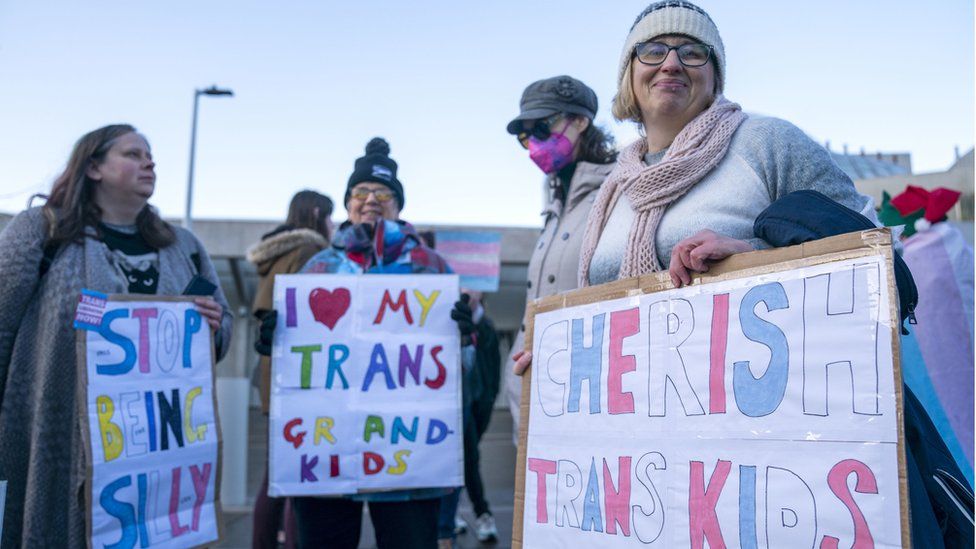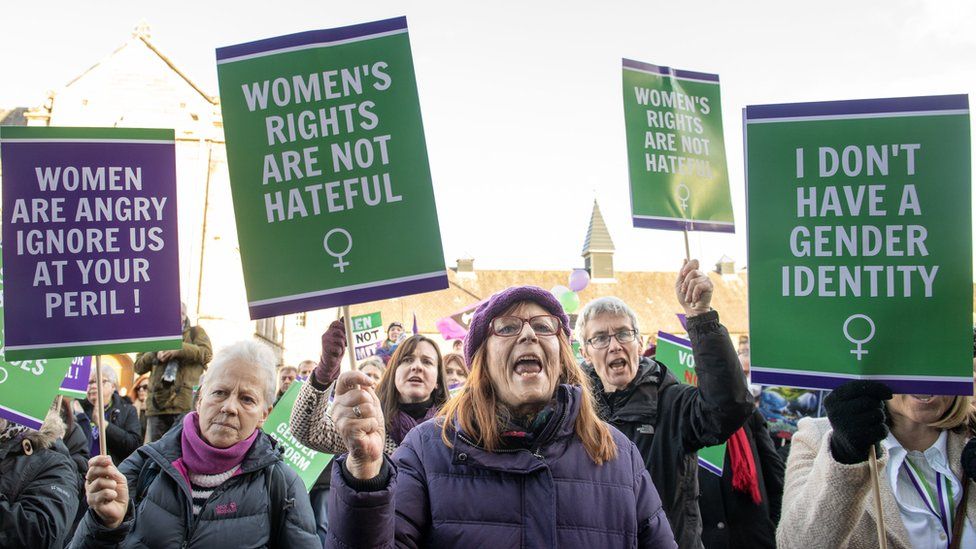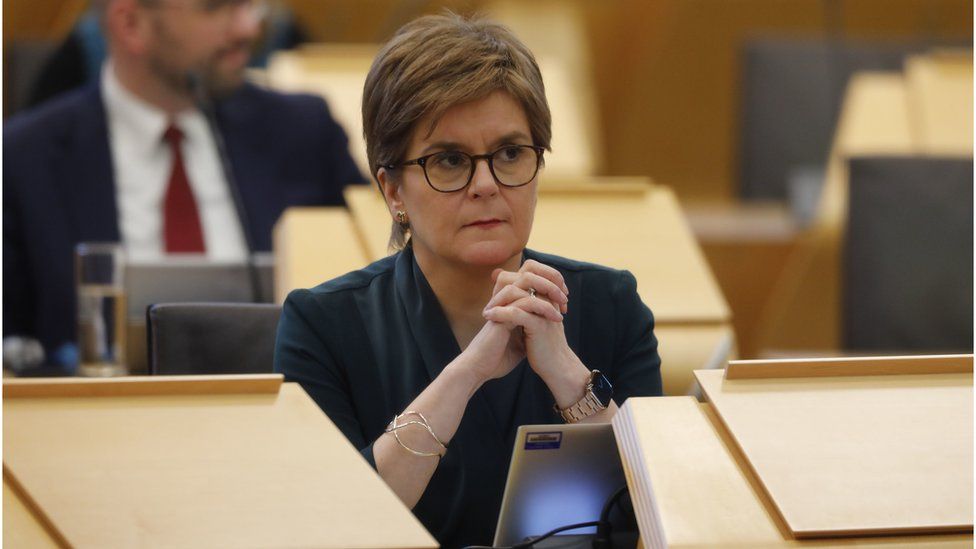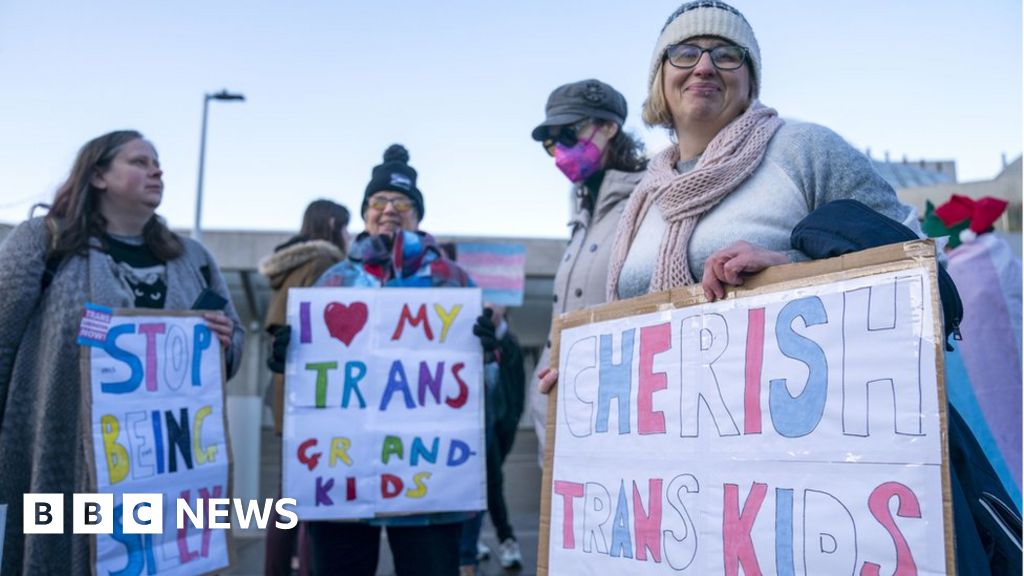
Scotland has become the first part of the UK to approve a self-identification system for people who want to change their legal gender.
The Scottish Parliament backed the controversial proposals by 86 to 39 in the final vote.
The reforms were opposed by several SNP MSPs, with one government minister resigning in protest earlier this year.
There were shouts of “shame on you” from protestors in the public galley as the result was announced.
The UK government has already said it has “concerns” about the legislation and could seek to prevent it becoming law by blocking Royal Assent.
People in Scotland have already been able to change their legal gender from male to female or female to male since 2005.
The Scottish government believes the existing process can be intrusive and distressing and put people off applying for a Gender Recognition Certificate (GRC).
The new rules, which are expected to come into force sometime next year, will lower the minimum age that people can apply for a GRC from 18 to 16.
They will also remove the requirement for a medical diagnosis of gender dysphoria.
And applicants will now only need to have lived in their acquired gender for three months – or six months if they are aged 16 and 17 – rather than two years.
There will be also be a three-month “reflection period” during which they can change their minds and it will be a criminal offence to make a false declaration or false application for a GRC, with anyone who does so potentially facing up to two years in prison.
But it will be possible to de-transition by going through the process again.

Campaigners say a move to make trans peoples’ lives easier is long overdue, and will allow them to “live with the dignity and recognition that everyone deserves.”
Scottish Trans manager Vic Valentine said the change in the law would mean that trans men and women would be able to “show a birth certificate that reflects who they are” at important moments in their lives such as starting a job or giving notice to be married.
But critics including author JK Rowling have raised concerns about the potential impact on women-only services, spaces and legal protections.
They have argued that there are insufficient safeguards to protect women and girls from predatory men who they say could seek to change their gender in order to gain access to facilities such as women’s prisons.
Speaking ahead of the vote, Social Justice Secretary Shona Robison said: “Trans rights are not in competition with women’s rights, and as so often before, we can improve things for everyone when those discriminated against act as allies, not opponents.”
And First Minister Nicola Sturgeon said she would “never apologise for trying to spread equality, not reduce it, in our country.”
This video can not be played
To play this video you need to enable JavaScript in your browser.
Efforts by some MSPs to keep the minimum age at 18 were voted down, as was an attempt by Conservative MSP Russell Findlay to prevent convicted sex offenders being allowed to change their gender.
The reforms were backed by most SNP, Labour, Liberal Democrat and Green MSPs but opposed by the majority of Conservatives, who accused the government of attempting to avoid proper scrutiny of the legislation by rushing it through before Christmas.
Scottish Conservative equalities spokeswoman Rachael Hamilton said the party supported trans rights – but it should not come “at the expense of the safety of women and girls, and their hard-won rights”.
She added: “For a majority of MSPs to vote against an amendment that would have prevented convicted sex offenders from applying for a Gender Recognition Certificate will astonish and outrage most Scots.”

The Bill, which was previously shelved by the government, has been been one of the most controversial pieces of legislation in the history of the Scottish Parliament, with Community Safety Minister Ash Regan resigning in October after saying she could not support the proposals.
MSPs considered more than 150 proposed amendments to the proposals in two marathon sessions on Tuesday and Wednesday – with the latter not finishing until 01:15 on Thursday.
The Conservatives were accused of attempting to delay the legislation by proposing numerous points of order and forcing almost all amendments to votes that were sometimes not required.
Nine other European countries have already adopted self-declaration systems for legal gender recognition, including Ireland, Denmark, Norway, Portugal and Switzerland.
The UK government has not ruled out mounting a legal challenge to the new Scottish system, with Scottish Secretary Alister Jack saying it “shares the concerns that many people have regarding certain aspects of this Bill, and in particular the safety issues for women and children”.
He added: “We will look closely at that, and also the ramifications for the 2010 Equality Act and other UK wide legislation, in the coming weeks – up to and including a Section 35 order stopping the Bill going for Royal Assent if necessary.”
The government is understood to be concerned about the potential impact of people with gender recognition certificates moving from Scotland to other parts of the UK, where a different system will still be in place, and on things like passports, pensions and some benefits.


Scotland is now the first part of the UK to have approved a self-identification process for legally changing gender.
It is a simplification of the current system, removing the need for medical certification, as has already happened in countries like Ireland and Denmark.
The epic debate and vote at Holyrood is not the end of the story because the legislation could yet face a legal challenge from womens’ groups.
The UK government, which has expressed concerns, is reserving its position on whether or not it will accept Scottish gender recognition certificates.
The Scottish government has yet to decide when in 2023 it wants the new process to take effect and has agreed to monitor the impact of the arrangements.
